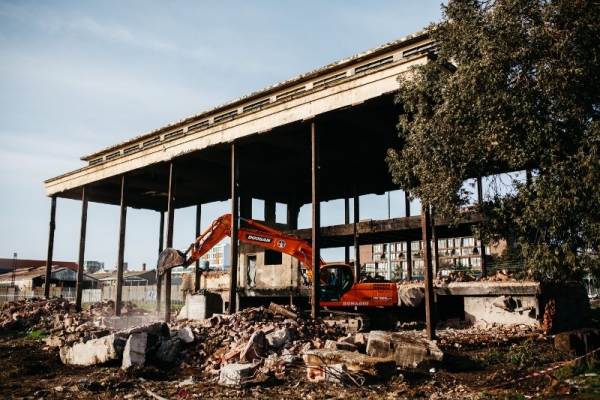Homeless people living near Biscuit Mill displaced

On Monday 15 June, contractors hired by the Passenger Rail Agency of South Africa (PRASA), began demolishing a building located on Railway Street across the train tracks from The Biscuit Mill. The building in question was a three-story building that was deemed “obsolete” by Henry Masimla, the PRASA real estate manager.
When the construction began in the early hours of last Monday morning, homeless people were still sleeping inside. According to the occupants, there was no widespread notice about the demolition so they were completely surprised and not given the opportunity to get their possessions out.
 The building in March, before it was demolished. Photo from Google Street View (fair use).
The building in March, before it was demolished. Photo from Google Street View (fair use).
Adam Schazili, a Somali man said, “Everyone left their stuff in the building and no one knew what was going on.” Joseph, another occupant, said that he had been sleeping in the building and had left his passport papers inside for safe keeping. Now, his papers have been destroyed. One occupant apparently had his arm broken in the demolition process as well.
About 70 to 80 people utilise the space, including women and children. Many, such as Albert [surname withheld], survive by scavenging from the nearby Woodstock Drop Off Facility. “Most of us, we are foreigners. Most guys have no passport, but have been here for a long time. I’ve been here since 1998, in Woodstock. I’ve never had a home…yesterday in the rain, you should have seen them, people sleeping in the dirt.”

Albert Schazili
Schazili said, “At night, they [law enforcement] come and get you. They’ll beat you to hell, man. Why you sleeping outside, is the only thing they say.”
Daud [surname withheld], another displaced occupant said, “If I sleep on a stoep, cops gonna take us to prison. A lot of us get 30 days, 60 days … for being here. They come in the night. They hit us. We run. They catch us. They shoot us. I’m telling you, these people they hit us. We scared! It’s not fair for us to be like this, man.”
Godfrey Montana, who comes from west Africa told of heightening strife between the immigrant and South African occupants. “In the day, everyone is together. We are brothers. But at night, everyone is afraid. You might get a knife in your back.” Montana became increasingly aggravated as he repeated, “Dangerous, this country. Too much politics. Too much apartheid. Too much hungry. Everything is changing. We do hard work, but small money.“
While in the area, there was a palpable tension as residents attempted to scavenge metal from the building rubble, while disagreements arose between various groups.

Residents work together to push a large piece of scrap metal from the demolition.
The occupants wanted to be heard, to have a record about the demolition of their home. “Now this is happening again to us, what is going to happen to us if no one is going to take note of our problem?” remarked Daud. “They rob us of a place. They didn’t even inform us they going to put down this building. The cops come here, we run. The cops catch us, we go to jail, they beat us, charge us with trespassing. But we used to living here. For us, it’s like they are trespassing on our ground. This is our comfort zone where we feel we survive. We survive by taking scrap. What can we do? We don’t want to steal, we want to survive.”
Henry Masimla, PRASA’s real estate manager said that the space was to become a parking lot. “[The demolition] is part of cleaning up the area … it’s a cesspool.”
Masimla’s goal for the area is to “attract the right element to the precinct, and not people doing drugs.” He said that the building was unsafe, particularly for women and children, because it housed so many drug users. Masimla said that tearing down the building was in the best interest of their safety. Masimla did not know where the displaced women and children would move after the demolition.
Rudolph Basson works with the TB/HIV Care Association. This organisation has been doing outreach in the area. It has a mobile clinic that runs out of a van. Basson said he and his colleagues were also surprised by the demolition. They had built relationships with many residents and were now scrambling to find displaced people who had tested positive for HIV, as well as several women who had positive pregnancy tests.
Prior to the demolition, TB/HIV Care Association was expanding its services in this area. Now, because of the unnoticed eviction of these residents, they are forced to restart their efforts as residents scramble to find other forms of shelter in various areas. Basson said, “This is how the City of Cape Town deals with homeless people all the time … There was a very large population of people sleeping there, hanging out there, using drugs etcetera. [The City] has got this illusion that by somehow by abusing and chasing homeless people away from someplace, the problem can be solved, which obviously isn’t the case as these people don’t have anywhere to go. It just perpetuates the cycle of displacement and dismay.”
Support independent journalism
Donate using Payfast

Don't miss out on the latest news
We respect your privacy, and promise we won't spam you.

This article is licensed under a Creative Commons Attribution-NoDerivatives 4.0 International License.
